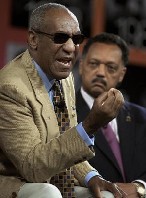Bush Finds Believer in Georgian Leader
"TBILISI, Georgia -- President Bush's vision of spreading freedom and democracy throughout the world has found a home in the heart of Georgian President Mikhail Saakashvili.
The 37-year-old, U.S.-educated freedom fighter who led a popular uprising in 2003 dubbed the "Rose Revolution," which ousted a former top Soviet official from power told The Washington Times yesterday that the U.S. president is on the right side of history.
"It's a new kind of ideology that we have from this president that's kind of crystallized now. It is idealistic. It's a much more moral position. It's also a very winning positive position," Mr. Saakashvili said. "I think President Bush was very fast to capture this mood," he added.
The Golden Fleece of FreedomThe new Georgian president, Mikhail Saakashvili, who was finally able to kick out the "mafiocracy" of Aslan Abashidze from Ajaria in May 2004 (even though the Russians still refuse to get their soldiers out of Abkazia and South Ossetia to this day) stood shoulder to shoulder with President Bush this week in Freedom Square, once called Lenin Square, and spoke in soaring rhetoric about the prospect of freedom and democracy to transform the world.
"So little wonder that over a quarter million Georgians turned out to hear the President of the United States celebrate the day, April 9, 1991, the statue of Lenin was pulled down at the very spot where he was speaking, and tell them “Americans respect your courageous choice for liberty – as you build a free and democratic Georgia, the American people will stand with you.” They cried tears of gratitude when his words were meant for Russia: “The territory and sovereignty of Georgia must be respected by all nations.”
(You can read the entire speech
here .)
"The people of Georgia recognize George Bush as the savior and protector of freedom that he is. Why can’t the Russians? Churchill said Russia was an enigma wrapped in a riddle inside a puzzle. Why can’t they live in peace with their neighbors instead of always wanting a piece of their neighbors? Part of the answer must lie in there being no word for 'peace' in the Russian language."
"The Russian word
mir is always translated as 'peace.' But
mir doesn’t mean peace, it means
order. For us peace means freedom, people being left alone without violence so they can conduct their lives and work towards their goals peacefully. For Russians, peace means conformity: when people are all good little boys and girls and do what they are told by their rulers, you have order and therefore peace."
"Put succinctly: 'Peace' in English means
the absence of violence. 'Peace' in Russian – Mir -- means
the absence of disobedience."
"Mir, Russian peace, can only come by being forcefully imposed on people and is always win-lose. As Lenin said, there is but one question of any importance in human relations:
Kto-Kovo? Who-Whom? Who wins, who loses? For Lenin, the only way to win was to make someone else lose. The concept of win-win, of mutual cooperation for mutual benfit was incomprehensible to him (literally, like creating something out of nothing). Putin, the ex-KGB agent looks at the world the same way.
It’s the Russians’ fatal mind-flaw."
"Until Putin and his fellow Russians abandon Kto-Kovo, the people of Georgia and those of other former Russian colonies will continue to look upon them as threats – and to seek protection from America."




































